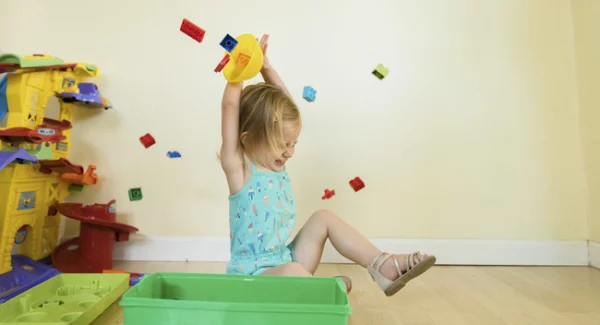At the age of 2, children often exhibit the behavior of throwing objects, a common habit that leaves many parents feeling perplexed. This behavior is not only a way for children to express curiosity but also an important developmental stage that helps them explore their surroundings. “When children throw things, they are not only learning about gravity but also testing their control and observing parental reactions.”
According to the American Academy of Pediatrics (2020), throwing objects is a way for children to communicate and understand their boundaries. Instead of forbidding or punishing this behavior, parents should focus on guiding their children toward appropriate handling. Certain items like foam balls or beanbags are safe options, while fragile or dangerous objects should be securely stored to ensure the child’s safety.
“Throwing objects is not a sign of mischief or intentional troublemaking but a natural expression during a child’s developmental phase. A reasonable parental response can help the child learn boundaries and gradually change this habit.”
To minimize instances of throwing objects during mealtime, parents can apply some practical strategies. Using dishes with suction bases can prevent children from tossing them onto the floor. Additionally, instead of placing all the food on the table at once, serve small portions and add more once the child has finished. “This approach not only helps the child focus on eating but also reduces boredom, which might lead to throwing.”

Outside of mealtime, children often throw objects during playtime to express excitement. Parents should channel this behavior through positive activities like throwing balls into a basket or playing target games with beanbags. “These games not only satisfy the child’s need for movement but also teach them precision and self-control.” According to a study by the Harvard Center on the Developing Child (2018), children are more likely to adopt rules when they are introduced in a playful context.
“Rather than focusing on preventing the behavior, provide opportunities for children to learn from their actions in a safe and enjoyable environment. This will lay the foundation for developing self-regulation skills.”
Finally, how parents respond plays a significant role in shaping their child’s behavior. If a child throws objects at inappropriate times, instead of scolding them, parents should remain calm and gently remind them. “Overemphasizing negative behavior can encourage children to repeat the action to gain attention.” Instead, focus on praising and encouraging positive behavior.
Raising children requires patience and creativity. When parents handle situations appropriately, children not only reduce their throwing habits but also learn essential skills that contribute to their holistic development in the future.


HPX24h > Parenting Tips > How to Prevent a 2-Year-Old from Throwing Things?
Top Reads from This Category
Parenting Tips
How to Stop Preschoolers from Putting Everything in Their Mouth?
Parenting Tips
Teaching Children Respect: Simple Tips for Parents with Kids Aged 6 to 8
Parenting Tips
How to Talk to Children About Poverty and Homelessness (Ages 5-8)
Parenting Tips
Fun Facts for 3-Year-Olds: Exploring the World of Animals and New Foods
Parenting Tips
Talking to Children About Race: How to Make It Easier?
Parenting Tips
Tips for Helping Preschoolers Develop Healthy Sleep Habits
Parenting Tips
How to Talk to Your Child About Divorce: Helpful Tips for Parents
Discover New Topics
Animals
The Stunning Image of a Cheetah in Action During Its Hunt
Fitness
Effective Training Tips to Enhance Muscular Endurance
Parenting Tips
How Much Sleep Do Children Really Need?
Science
Gold in the Human Body: A Scientific Look at the ‘Hidden Gold’ Inside You
Science
Regrowing Adult Teeth in Just 9 Weeks: Science Turns the Impossible into Reality
Healthy Eating
How to Create a Diet that Reduces Disease Risk While Still Being Delicious?
Science
The Mystery of the Brain Network that Regulates Human Attention Has Been Unveiled
Health
How Losing Just 5% of Your Weight Can Reduce the Risk of Diabetes
Space
Scientists Discover Dark Galaxy Located 10 Billion Light-Years from Earth
Animals
Why Bedbugs Thrive Through Inbreeding
Science
Implanting an NFC Chip into the Hand – When Technology and Humans Merge
Parenting Tips
Excessive Night Sweating in Children – A Normal Occurrence or a Cause for Concern?
Parenting Tips
How to Talk to Your Child About Drugs Effectively